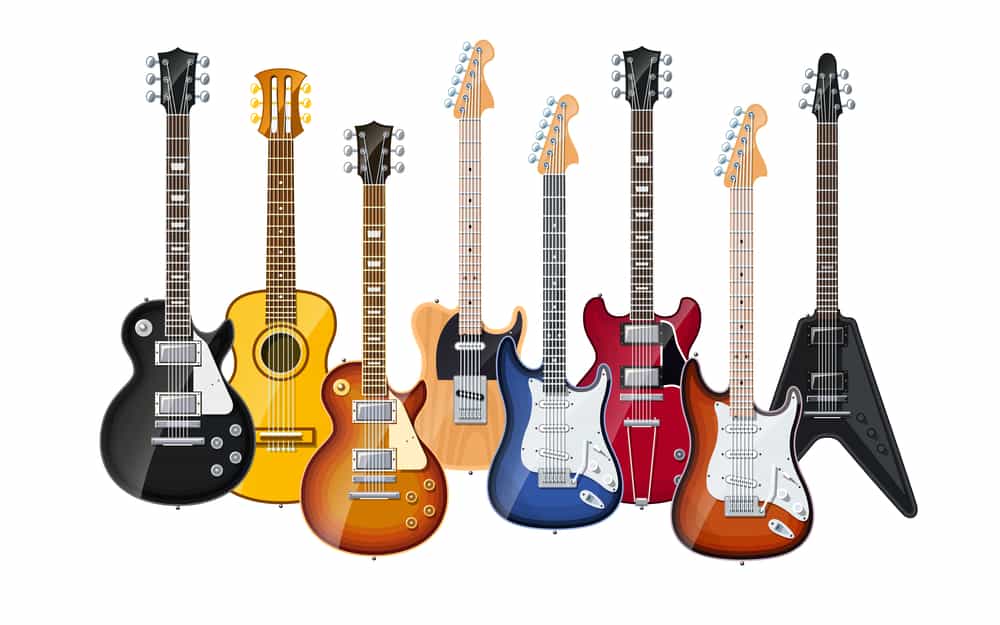Picking up a new hobby can be a daunting prospect, especially when you’re starting from scratch with little or no knowledge about the particular subject. This especially holds true when you’re learning a new instrument.
In this guide, we look at the guitar and we talk about how fast you can learn guitar, realistically speaking of course.
Everyone has a different goal when it comes to music and learning a new instrument. Your goals will ultimately determine how quickly you learn the guitar. Some people may simply want to learn a simple chord progression, others may simply want a way to pass the time and others may want to become guitar virtuosos.
Is Guitar Hard To Learn?
In many ways, this feels like a trick question as there isn’t one answer. If you ask your friend who quit after a month they will probably say yes, but if you ask a seasoned guitarist they may simply say no.
However, the most accurate way to answer this question would be to say that it depends on you. Your level of determination will influence how quickly you advance as a guitarist. If you are prone to getting frustrated or giving up easily then you might find it rather difficult to learn guitar. Patience and diligence is required. After all, Rome wasn’t built in a day and similarly, you will not learn the guitar in a day.
Acoustic Guitar vs. Electric Guitar
There are several different types of guitars available; acoustic, electric and bass. Although all are similar, they are also different. For instance, the standard guitar has six strings while the bass guitar typically has four strings. For the purpose of this article, we will be focusing on the standard six-string guitar.
Choosing between an electric guitar and an acoustic guitar will come down to your end goal. If you want to play blazing guitar solos in a band then the most viable choice would be an electric guitar. If you instead want to be a classically trained guitarist then an acoustic guitar is the most suitable option.
Some people consider the acoustic guitar harder to learn due to the strings being slightly thicker than those of an electric guitar. An easy way to remedy this is to pop into your local store and pick up a set of strings that has a lighter gauge.
Regardless of your preference, your guitar playing skills are transferable from acoustic to electric and vice versa. There is no guarantee that you will learn faster with an electric guitar as opposed to an acoustic. How quickly you advance will depend on your determination.
The golden rule before buying any new equipment is ‘try before you buy’, so make sure you at least try out the instrument before making the final purchase. If an electric guitar feels more comfortable to you than an acoustic then go for it!
Practice, Practice, Practice!
As a musician, continually practicing your craft is the most effective way to become better and advance your skills. There is no short-cut around practice and this is what separates the professionals from the amateurs.
Setting up a consistent practice schedule is extremely important for any musician, especially if you are just starting out for the first time. Having a structure you can follow will let you focus on specific goals. Think of it as going to the gym, you split up your workouts over the week and focus on a particular muscle group for each session.
When setting up your practice routine, there are two basic things you must take into consideration:
- Duration
- A specific goal/technical skill
In terms of duration, it is important to set a realistic amount of time for yourself. For instance, if you work a day job and practice in the evening then scheduling a 2-hour practice session may be unrealistic as you will be fatigued from work and may simply lack the concentration. As such working in 30 min – 1-hour block may be more beneficial.
Once you’ve figured out how long you’ll be practicing each day you will then need to decide on the objective of that session i.e. which aspect of your guitar playing you want to focus on. For example, you may choose to focus on strumming on Monday, picking on Tuesday and so on and so forth.
You must realize from the onset that there is a clear difference between focused practice and simply just ‘playing/jamming’.
To highlight the importance of practice, Jason Becker would literally fall asleep with a guitar in his hands and he would actually carry a small guitar in his car so he could practice in traffic. While we do not recommend playing guitar while driving, this just highlights the lengths that guitar greats have gone to in order to perfect their craft. PRACTICE!
Below is a sample practice schedule:
| Monday | Tuesday | Wednesday | Thursday | Friday | Saturday | Sunday | |
| Time | 7pm | 7pm | 7pm | 7pm | 7pm | 3pm | 3pm |
| Duration | 1hr | 1hr | 1hr | 1hr | 1hr | 2hrs | 2hrs |
| Focus Area | Music theory | Scales | Chords | Strumming | Jamming | Learn a new song | Picking exercises |
Everyone’s needs are different so you can adjust the schedule accordingly. This is merely to give you an idea of how to structure your sessions.
Average Time It Takes To Learn Guitar
It’s difficult to give an accurate estimation of how long it takes to learn guitar on average. This is because there are many variables that affect how we all progress individually, as we have already discussed.
However, you should be able to play basic chord progressions within your first four weeks of playing guitar. This is of course provided that you stick to your practice regiment and set clear outlines of what you want to achieve. For instance, it is unlikely you will be able to play Jimi Hendrix guitar solos within the first month but you can probably play the rhythm guitar parts to some of his songs.
The 10,000 Hours Rule
The 10,000 Hours Rule is a concept that applies to virtually every aspect of life. To simplify it, the theory suggests that it takes us 10,000 hours of practice in order to truly master/perfect a craft.
This would basically translate to practicing for 20 hours every week for 10 years.
While there are many interesting takes on this theory, the one thing that holds true is that anyone who has invested a large amount of time on their craft is bound to experience some measure of success.
Will I Need Guitar Lessons?
Whether or not one needs lessons in order to learn how to play guitar is a common question that recurs year in, year out. Despite how often this comes up, it is a relevant question and one worth discussing.
If you are unable to take lessons due to financial restraints or maybe lack of time then fret not, there are many available resources to help you achieve your goal of playing guitar. Luckily we live in the digital age where all the information we need is readily available at our fingertips. The internet is chock full of videos, articles, guides, etc to help you learn.
Worth noting is that the ‘free’ guitar lessons available online will only teach you so much. While these are a great starting point, they often lack continuity and it may be hard to judge your progress. With a teacher, you are able to track your progression through the exercises they give you and the ‘score’ they give you.
Tips and Tricks
To help you get to your goals faster, we’ve compiled a small list of things you can do:
- Learn music theory: This may seem like a no-brainer but an astounding number of new, and seasoned, guitarists overlook this step. This will help you build a solid foundation for the future.
- Use a metronome: Using a metronome will help you stay in time as you do your practice exercises and learn new songs. You will be able to adjust the tempo to challenge yourself to play faster.
- Use guitar tabs: If you have no knowledge of music theory then learning how to read guitar tabs will be extremely helpful. They are easy to learn and you can readily find tabs to virtually any song online.
- Play along to songs: Apart from learning the riffs and chords to songs, playing alongside them will help you develop your skills as it will give you the feel of playing with other musicians. This is a basic tip but one that most guitarists swear by.
- Learn guitar scales: This is the first step towards you becoming a master of shredding. Learning scales will allow you to easily solo of any song. Start with the basic pentatonics and move on to more advanced scales as you advance.
- Play by ear: Playing by ear is one of the most important skills you can have as a musician. This takes a lot of practice so you can find the right key and the right scale. Although challenging, it is highly recommended that you try to play along to some of your favorite songs by ear, even if you’ll just be playing simple 1-string melodies.
Bonus tip: Get yourself a capo – it will allow you to shift between keys easily and enable you to play things that would be impossible otherwise. Read our review of the best capos for acoustic and electric guitars.
Did You Know?
- It takes 2 months, or 66 days, on average to form a habit. You should, therefore, give yourself this lee-way as you settle into your practice regime.
- Most new guitarists quit within the first three months due to frustration from setting unrealistic goals.
- Steve Vai, considered one of the most accomplished guitarists to grace the Earth, would practice for up to 12 hours a day when first learning guitar.
- English songwriter and guitarist James Bay taught himself how to play guitar with the use of YouTube videos.
- Legendary blues guitarist B.B. King was self-taught and is one of the most revered guitarists of all time.



